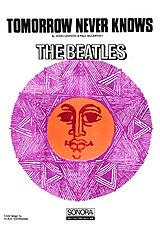| "Tomorrow Never Knows" | |
|---|---|
 Cover of the Northern Songs sheet music (licensed to Sonora Musikförlag) | |
| Song by the Beatles | |
| from the album Revolver | |
| Released | 5 August 1966 |
| Recorded | 6, 7 and 22 April 1966 |
| Studio | EMI, London |
| Genre | |
| Length | 2:58 |
| Label | Parlophone |
| Songwriter(s) | Lennon–McCartney |
| Producer(s) | George Martin |
| Audio sample | |
"Tomorrow Never Knows" is a song by the English rock band the Beatles, written primarily by John Lennon and credited to Lennon–McCartney.[9] It was released in August 1966 as the final track on their album Revolver, although it was the first song recorded for the LP. The song marked a radical departure for the Beatles, as the band fully embraced the potential of the recording studio without consideration for reproducing the results in concert.
When writing the song, Lennon drew inspiration from his experiences with the hallucinogenic drug LSD and from the 1964 book The Psychedelic Experience: A Manual Based on the Tibetan Book of the Dead by Timothy Leary, Richard Alpert and Ralph Metzner. The Beatles' recording employed musical elements foreign to pop music, including musique concrète, avant-garde composition and electro-acoustic sound manipulation.[10] It features an Indian-inspired modal backing of tambura and sitar drone and bass guitar, with minimal harmonic deviation from a single chord, underpinned by a constant but non-standard drum pattern; added to this, tape loops prepared by the band were overdubbed "live" onto the rhythm track. Part of Lennon's vocal was fed through a Leslie speaker cabinet, normally used for a Hammond organ. The song's reverse guitar parts and effects marked the first use of reversed sounds in a pop recording, although the Beatles' 1966 B-side "Rain", which they recorded soon afterwards using the same technique, was issued over two months before the release of Revolver.
"Tomorrow Never Knows" was an early and highly influential recording in the psychedelic and electronic music genres, particularly for its pioneering use of sampling, tape manipulation and other production techniques. It also introduced lyrical themes that espoused mind expansion, anti-materialism and Eastern spirituality into popular music. On release, the song was the source of confusion and ridicule by many fans and journalists; it has since received praise as an effective representation of a psychedelic experience. Pitchfork placed the track at number 19 on its list of "The 200 Greatest Songs of the 1960s", and Rolling Stone ranked it at number 18 on the magazine's list of the 100 greatest Beatles songs.
- ^ DeRogatis 2003, pp. 14, 48.
- ^ Bernstein, David W. (2008). The San Francisco Tape Music Center: 1960s Counterculture and the Avant-garde. University of California Press. p. 247.
- ^ Ray, Michael (2012). Alternative, Country, Hip-hop, Rap, and More: Music from the 1980s to Today. Britannica Educational Pub. p. 144.
- ^ Echard 2017, p. 6.
- ^ Hasted, Nick (2017). "4: The Suburban Hit Machine". You Really Got Me: The Story of The Kinks. Omnibus.
- ^ Holmes 2012, p. 468.
- ^ Vance, Joel (February 1972). "The Fragmentation of Rock" (PDF). Stereo Review. p. 64. Retrieved 30 July 2021.
- ^ Hoberman, J. (10 November 2010). "Before There Was MTV, There Was Bruce Conner". The Village Voice. Archived from the original on 29 November 2016. Retrieved 2 October 2018.
- ^ Gilliland, John (1969). The Rubberization of Soul: The great pop music renaissance (audio). Pop Chronicles. Show 39, tracks 4–5. digital.library.unt.edu.
- ^ Horn, David (2017). Bloomsbury Encyclopedia of Popular Music of the World, Volume 11: Genres: Europe, Volumes 8-14. Bloomsbury Publishing. p. 36. ISBN 9781501326103. Retrieved 21 December 2017.